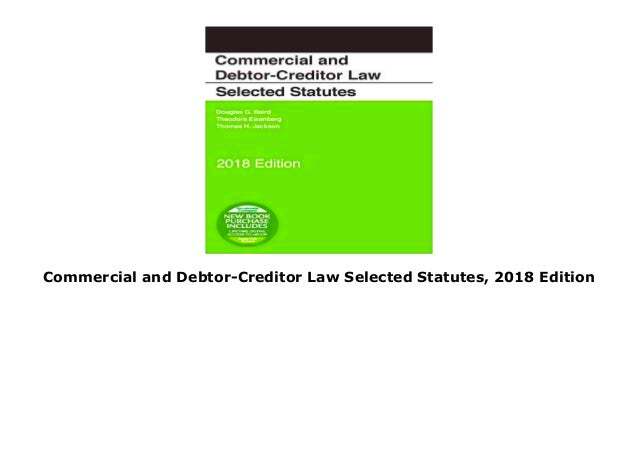Commercial and Debtor-Creditor Law Selected Statutes Explained
Commercial and debtor-creditor law deals with the rights and obligations between businesses, creditors, and debtors. These laws help to ensure fair practices in financial transactions. Understanding these laws is crucial for anyone involved in business, whether as a creditor or a debtor. Knowing your rights can save you from potential financial pitfalls and disputes.
Overview of Key Statutes in Commercial Law
Commercial law encompasses a range of statutes that govern business transactions. Here are some of the most significant statutes:
- Uniform Commercial Code (UCC): This set of laws standardizes commercial transactions across states, promoting consistency.
- Fair Debt Collection Practices Act (FDCPA): This federal law regulates how debt collectors can operate, protecting consumers from harassment.
- Bankruptcy Code: This law outlines the processes for individuals and businesses to seek relief from debt.
- Sales Act: This governs the sale of goods, ensuring that transactions are fair and equitable.
Each of these statutes plays a critical role in facilitating smooth commercial operations while protecting the interests of both parties involved in transactions.
Understanding the Uniform Commercial Code
The Uniform Commercial Code, or UCC, is a vital piece of legislation that affects businesses across the United States. Its primary purpose is to harmonize the law governing commercial transactions, making it easier for businesses to operate across state lines. Here are some key points to understand:
- Scope of the UCC: It covers various aspects of commercial transactions, including sales of goods, leases, negotiable instruments, and secured transactions.
- Article 2: This part of the UCC specifically deals with the sale of goods and outlines the rights and obligations of buyers and sellers.
- Flexibility: The UCC allows for flexibility in contracts, enabling parties to negotiate terms that suit their needs.
- State Adoption: While the UCC is a uniform law, it must be adopted by individual states, leading to some variations.
Understanding the UCC is essential for anyone involved in business transactions, as it lays the groundwork for many commercial interactions.
Essentials of the Fair Debt Collection Practices Act
The Fair Debt Collection Practices Act (FDCPA) is a crucial federal law that protects consumers from abusive practices by debt collectors. Enacted in 1977, it aims to eliminate unfair collection methods and ensure that debt collectors treat consumers fairly. Understanding the key provisions of the FDCPA can empower consumers and help them navigate debt-related challenges more effectively.
Here are some essential aspects of the FDCPA:
- Prohibited Practices: The FDCPA prohibits debt collectors from using deceptive or abusive tactics, such as:
- Harassment or intimidation
- False statements about the debt or the consequences of non-payment
- Contacting consumers at inconvenient times, like late at night
- Consumer Rights: Under the FDCPA, consumers have specific rights, including:
- The right to request validation of the debt
- The right to stop communication with the collector
- The right to sue for damages if the law is violated
- Enforcement: Consumers can enforce their rights by reporting violations to the Federal Trade Commission (FTC) or filing a lawsuit.
Overall, the FDCPA plays a vital role in ensuring that debt collection practices remain fair and transparent, providing peace of mind to consumers dealing with financial challenges.
Importance of the Bankruptcy Code
The Bankruptcy Code is a significant federal law that provides individuals and businesses a way to restructure or eliminate their debts when facing financial difficulties. Understanding its importance is crucial for anyone considering bankruptcy as a viable option.
Here’s why the Bankruptcy Code is essential:
- Types of Bankruptcy: The Bankruptcy Code outlines several types of bankruptcy, including:
- Chapter 7: Liquidation bankruptcy, where non-exempt assets are sold to pay creditors.
- Chapter 11: Reorganization bankruptcy, primarily for businesses to restructure debts while continuing operations.
- Chapter 13: A repayment plan for individuals to pay off debts over time while keeping their property.
- Fresh Start: Bankruptcy provides a “fresh start” for debtors, allowing them to rebuild their financial lives after discharging certain debts.
- Automatic Stay: When a bankruptcy case is filed, an automatic stay goes into effect, halting collection efforts and lawsuits against the debtor.
- Credit Impact: While bankruptcy can negatively affect credit scores, it can also provide relief from overwhelming debt and the chance to rebuild credit over time.
Understanding the Bankruptcy Code is essential for anyone facing financial hardship, as it offers pathways to regain financial stability.
Legal Rights and Responsibilities of Creditors
Creditors play a vital role in the commercial landscape, and understanding their legal rights and responsibilities is essential for both creditors and debtors. Creditor laws ensure that creditors can pursue debts while also protecting consumers from unfair practices.
Here are key rights and responsibilities of creditors:
- Rights of Creditors: Creditors have several rights, including:
- The right to receive payment for the debt owed.
- The right to pursue legal action to recover debts, including filing lawsuits.
- The right to report unpaid debts to credit bureaus.
- Responsibilities of Creditors: Creditors must also adhere to certain responsibilities, such as:
- Complying with the Fair Debt Collection Practices Act.
- Providing accurate information regarding the debt.
- Being transparent about the terms of repayment and any fees associated with the debt.
- Collection Practices: Creditors must engage in ethical collection practices, avoiding harassment and maintaining professionalism during interactions with debtors.
By understanding their rights and responsibilities, creditors can foster positive relationships with debtors while ensuring compliance with the law.
Debtors’ Rights Under the Law
Understanding debtors’ rights is crucial for anyone facing financial difficulties. These rights help protect individuals from abusive collection practices and provide pathways for managing debt. The law ensures that debtors are treated fairly and have options available when struggling to meet their obligations.
Here are some key rights that debtors should be aware of:
- Right to Fair Treatment: Debtors have the right to be treated fairly and with respect by creditors and debt collectors. This includes being free from harassment and intimidation.
- Right to Request Debt Validation: Debtors can request validation of the debt, meaning the creditor must provide proof that the debt is legitimate and that they have the right to collect it.
- Right to Stop Communication: Under the Fair Debt Collection Practices Act, debtors can request that debt collectors cease communication, allowing them time to handle their financial situation.
- Right to File for Bankruptcy: If debts become overwhelming, debtors have the right to file for bankruptcy, which can provide relief and help restructure or discharge certain debts.
- Right to Privacy: Debtors have the right to privacy regarding their financial situation, and collectors must respect this by not disclosing information to unauthorized third parties.
Being informed about these rights can empower debtors, helping them navigate their financial challenges more effectively.
FAQ about Commercial and Debtor-Creditor Law
Many people have questions about commercial and debtor-creditor law. This section addresses some common inquiries to provide clarity and understanding.
- What is the Fair Debt Collection Practices Act?
The FDCPA is a federal law that regulates how debt collectors can operate, ensuring they treat consumers fairly and do not engage in abusive practices. - How does bankruptcy affect my credit score?
Bankruptcy can negatively impact your credit score, but it also provides an opportunity for a fresh start and the chance to rebuild credit over time. - What rights do creditors have?
Creditors have the right to collect debts owed to them, pursue legal action if necessary, and report unpaid debts to credit bureaus, but they must comply with the law. - Can I negotiate my debts?
Yes, many creditors are willing to negotiate terms, including payment plans or settlements, especially if they believe it increases the likelihood of receiving payment. - What should I do if I’m being harassed by debt collectors?
Document the harassment and consider filing a complaint with the Federal Trade Commission (FTC) or seeking legal assistance to address the issue.
These FAQs help demystify the complexities of commercial and debtor-creditor law, making it easier for individuals to navigate their financial obligations.
Conclusion on Selected Statutes in Commercial and Debtor-Creditor Law
In summary, understanding commercial and debtor-creditor law is essential for both creditors and debtors. Key statutes like the Fair Debt Collection Practices Act, the Bankruptcy Code, and the Uniform Commercial Code lay the groundwork for fair and ethical financial transactions.
By being aware of these laws, individuals can better protect their rights and navigate the complexities of debt and credit. Here’s a quick recap:
- Debtors have rights: They deserve protection from abusive practices and have avenues for relief, like bankruptcy.
- Creditors must comply with the law: They have rights but also bear responsibilities to treat debtors fairly.
- Statutes provide structure: Laws like the UCC ensure consistency in commercial transactions, benefiting all parties involved.
Ultimately, being informed about these statutes helps create a balanced and fair environment in commercial dealings, promoting trust and accountability in financial relationships.

